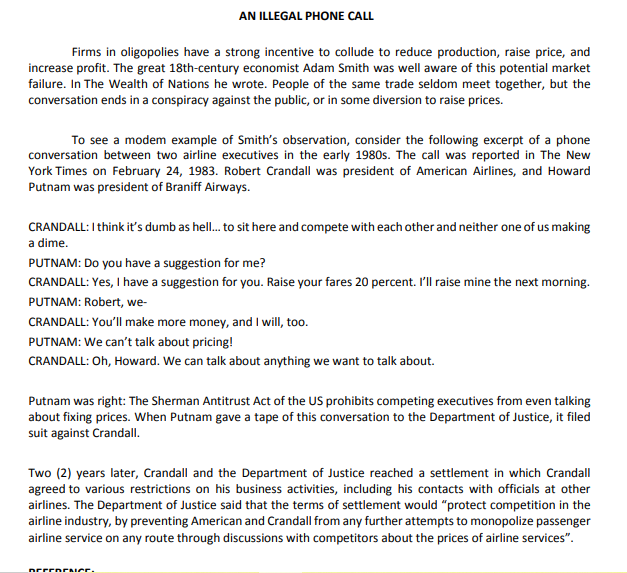What kind of game (according to outcome and sequence) is Crandall proposing to Putnam? 2. If Putnam agreed with Crandall’s proposal, how will this decision affect the buyers?
What kind of game (according to outcome and sequence) is Crandall proposing to Putnam? 2. If Putnam agreed with Crandall’s proposal, how will this decision affect the buyers?
Chapter15: Oligopoly And Strategic Behavior
Section: Chapter Questions
Problem 7P
Related questions
Question
Questions:
1. What kind of game (according to outcome and sequence) is Crandall proposing to Putnam?
2. If Putnam agreed with Crandall’s proposal, how will this decision affect the buyers?

Transcribed Image Text:AN ILLEGAL PHONE CALL
Firms in oligopolies have a strong incentive to collude to reduce production, raise price, and
increase profit. The great 18th-century economist Adam Smith was well aware of this potential market
failure. In The Wealth of Nations he wrote. People of the same trade seldom meet together, but the
conversation ends in a conspiracy against the public, or in some diversion to raise prices.
To see a modem example of Smith's observation, consider the following excerpt of a phone
conversation between two airline executives in the early 1980s. The call was reported in The New
York Times on February 24, 1983. Robert Crandall was president of American Airlines, and Howard
Putnam was president of Braniff Airways.
CRANDALL: I think itť's dumb as hel. to sit here and compete with each other and neither one of us making
a dime.
PUTNAM: Do you have a suggestion for me?
CRANDALL: Yes, I have a suggestion for you. Raise your fares 20 percent. I'll raise mine the next morning.
PUTNAM: Robert, we-
CRANDALL: You'll make more money, and I will, too.
PUTNAM: We can't talk about pricing!
CRANDALL: Oh, Howard. We can talk about anything we want to talk about.
Putnam was right: The Sherman Antitrust Act of the US prohibits competing executives from even talking
about fixing prices. When Putnam gave a tape of this conversation to the Department of Justice, it filed
suit against Crandall.
Two (2) years later, Crandall and the Department of Justice reached a settlement in which Crandall
agreed to various restrictions on his business activities, including his contacts with officials at other
airlines. The Department of Justice said that the terms of settlement would "protect competition in the
airline industry, by preventing American and Crandall from any further attempts to monopolize passenger
airline service on any route through discussions with competitors about the prices of airline services".
Expert Solution
This question has been solved!
Explore an expertly crafted, step-by-step solution for a thorough understanding of key concepts.
This is a popular solution!
Trending now
This is a popular solution!
Step by step
Solved in 3 steps

Knowledge Booster
Learn more about
Need a deep-dive on the concept behind this application? Look no further. Learn more about this topic, economics and related others by exploring similar questions and additional content below.Recommended textbooks for you

Exploring Economics
Economics
ISBN:
9781544336329
Author:
Robert L. Sexton
Publisher:
SAGE Publications, Inc

Managerial Economics: Applications, Strategies an…
Economics
ISBN:
9781305506381
Author:
James R. McGuigan, R. Charles Moyer, Frederick H.deB. Harris
Publisher:
Cengage Learning


Exploring Economics
Economics
ISBN:
9781544336329
Author:
Robert L. Sexton
Publisher:
SAGE Publications, Inc

Managerial Economics: Applications, Strategies an…
Economics
ISBN:
9781305506381
Author:
James R. McGuigan, R. Charles Moyer, Frederick H.deB. Harris
Publisher:
Cengage Learning




Microeconomics: Principles & Policy
Economics
ISBN:
9781337794992
Author:
William J. Baumol, Alan S. Blinder, John L. Solow
Publisher:
Cengage Learning